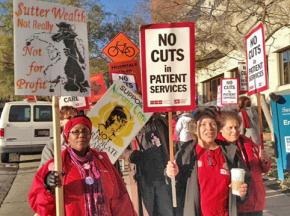Xmas Eve strike of the nurses
Nurses remain steadfast in their struggle at Sutter Health, reports .
SOME 5,000 nurses in the Bay Area staged a one-day strike on December 24 to stop cuts to nurse and patient-care standards proposed by medical giant Sutter Health.
While sticking points at the different facilities vary, some of the nurses' concerns include nurse-to-patient ratios (San Jose), elimination of paid sick-leave and medical-leave benefits (Oakland and Berkeley) and elimination of health care benefits for nurses and tech workers with schedules of less than 30 hours per week (East Bay).
The cuts hit mental health services hardest. Sutter has slashed the number of inpatient beds for both adult and adolescent mental health patients. Because the strike was scheduled for December 24, just days after the horrific school shooting in Connecticut, striking nurses included a "Vigil for Peace."
"At a time when mental illness is on the rise, Sutter Health in particular has made major cuts in services throughout its psychiatric units. Adolescent, adult and geriatric--nothing has been spared," said Efren Garza, an adolescent psychiatric nurse at Sutter.

Sutter Health is one of the most profitable health care providers in the country, with profits exceeding $4 billion since 2005. Sutter executives' compensation has doubled during the past four years, and its top 28 executives made more than $1 million in total compensation last year. Sutter CEO Pat Fry "earned" more than $5.2 million in 2011 while Sutter East Bay Region President David Bradley's 2011 compensation exceeded $1.6 million.
Meanwhile, Sutter is shortchanging nurses and patients. The December 24 strike was the eighth of its kind in the last year, and yet Sutter still seems committed to its drive to bust the union.
According to a National Nurses United press release, Sutter nurses even sent a letter to Sutter executives offering to call off the strike if Sutter management agreed to "agree to withdraw demands for sweeping and unwarranted reductions in patient care protections and other contract standards, which is at the heart of the dispute between the California Nurses Association/National Nurses United and local Sutter hospitals." Sutter refused.
But the commitment of Sutter executives to driving down wages and benefits for nurses even if it means sacrificing patient care has been matched by the determination of nurses to resist them.
"Like so many of my colleagues, I have raised a family here in San Jose," said Amy Santos, a registered nurse in the telemetry care unit at San Jose's Regional Medical Center. "We need to have patient care protections such as safe patient-lifting teams and appropriate staffing at all times as patients are admitted and discharged throughout the day. That is not the case on the majority of our units at this time."
Rochelle Pardue-Okimoto is a registered nurse at Alta Bates Summit Medical Center in Berkeley, Calif. On the eve of the strike, she explained that her determination--like thousands of other Sutter nurses--is reinforced by her concern for the patients she treats.
"We do not want to strike and have offered to settle with our current contract, but Sutter refuses, appearing more interested in union busting than negotiating," said Pardue-Okimoto. "As a nurse, I will never give up my union rights as that gives me a voice in the hospital and gives the patient an advocate. My special interest is not making money; it is delivering quality care to my patients."
Sutter Health followed previous one-day strikes with four-day lockouts, claiming it had no choice because of an unbreakable five-day contract with the company supplying the scab nurses. But except in San Jose, this one-day strike didn't trigger the customary five-day lockout, raising doubts that Sutter imposed the lockout for any reason other than to punish the nurses.


